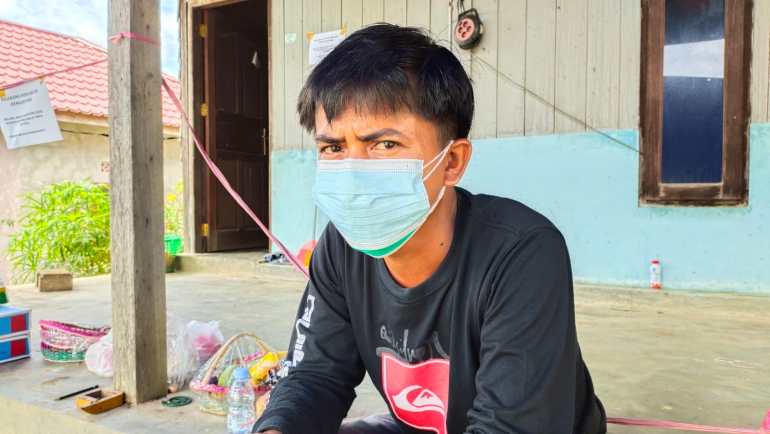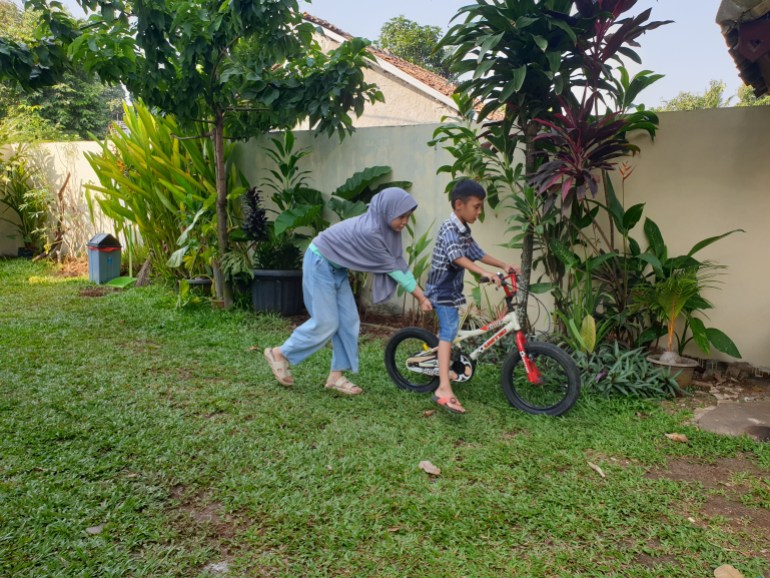A new generation of orphans as COVID ravages Indonesia
As Indonesia’s COVID-19 death toll rises, too many young children are learning the despair of losing their parents.

West Kutai and Tangerang, Indonesia – At a cemetery in East Kalimantan, 13-year-old Arga stands before his parents’ graves, dressed in a hazmat suit.
Relatives have gathered around the cemetery for his mother’s funeral. Arga’s face is covered, but his voice reveals his grief. It shakes as he recites the call to prayer.
Keep reading
list of 4 itemsIndonesia extends COVID curbs by a week as hospitals deluged
Bali hit by ‘oxygen crisis’ as Indonesia’s COVID struggles rise
COVID-positive man boards Indonesia flight disguised as wife
Both his parents died from COVID-19. They are buried beside each other.
Arga lives at an Islamic boarding school, and his parents would often send him parcels of homemade food.
But when the packages stopped coming, Arga became suspicious that something was wrong, and he wrote a letter to his mother.
“Are you sick, mum? Call me when you are okay. Please get enough sunlight,” he wrote.
“I am healthy here, don’t worry about me. I have 133,000 rupiah [$9] in my bank account, it’s enough for me.”
She never got the chance to open the letter.

“His father died on Thursday, and he did not know, as we did not tell him. And then on Saturday, his mother died too,” Leo Nita, Arga’s aunt, said.
“No one wanted to tell him. But his elder brother insisted that we must.”
Arga’s 17-year-old brother could not attend the funeral because he too had tested positive for the virus, but now that he has recovered, it is up to him and Arga to work out a future for themselves and their two younger siblings, aged nine and four.
‘Why did my parents leave me so fast?’
Around Indonesia, as the health crisis from COVID-19 continues, more and more children are facing Arga’s trauma and grief.
10-year-old Alviano, who is also in East Kalimantan, has just received a new fishing rod as a gift from his father’s friend.
As he strings the rod, he reminisces about his father.
“I love fishing … I often went fishing with my dad when he finished work,” he said. “Some fish were as big as his thigh. Sometimes we went fishing for shrimps.”
Two weeks ago, his mother died in hospital from COVID-19. She was five months pregnant. The next day, his father died too.
“He said … why did my parents leave me so fast? We try to be strong for him but it’s devastating for us,” Margono, Alviano’s uncle, said.
For two weeks, Alviano was also COVID-19 positive, and during that time, he had to live alone.
Relatives and family friends slept outside on the porch, so he would not feel lonely.
“He would look outside the window and see us. Many of his friends and family were sleeping outside. So he didn’t feel alone,” Margono said.
On Tuesday, Alviano will move in with his grandparents, who live across the sea in Java.
‘The impact is very concerning’
Children’s rights organisations have noted that social workers around the country are reporting an increase in orphaned children.
Dino Satria from Save the Children Indonesia says it is difficult to know exactly how many children have lost their parents because of Indonesia’s low COVID-19 testing rates and inadequate data collection.
“We don’t have the exact data but there are cases where the children don’t have anyone to support them. They don’t have extended families or anyone who can take care of them,” he said.
Satria fears for the children who miss out on help because their parents’ deaths went unreported.
“We urge the government to strengthen support systems at the community level, where we can gather that information because right now, we don’t have that information,” he said.
“Also, the information is not specific. For example, during COVID, the information we have is that someone died… we don’t know more about them, if they had children or not.”

Indonesia’s Social Ministry has long asked hospitals to record information about their patients’ family members, so arrangements can be made for their children if necessary.
But as Indonesia’s hospitals have been stretched to their limits by COVID-19, and deaths at home have increased, it is more challenging to find and support children in need.
“The problem is, the process hasn’t run very well. COVID cases increased significantly. What we have now is just partial data and it is not very systematic yet,” Kanya Eka Santi, the Director of Children’s Rehabilitation at the Social Ministry, said.
Santi said it is even more challenging to find homes for children in need, as many households are experiencing economic hardship due to COVID-19 restrictions.
“Some do not want to accept the child because they cannot afford them, even if it is their own grandchild,” she said.
“During COVID, the financial situation is even harder. Some people have trouble even getting food, so if we ask them to take on a child, that is even more difficult.”
Santi says sending a child to an orphanage is the last resort.
“When the extended family cannot do it, the next option is foster care, guardianship or adoption,” she said.
“We have more problems when a child doesn’t have any relatives and has no place to go.”
‘I thought she was sleeping’
10-year-old Aisyah is one of the children in foster care in Tangerang, on the outskirts of the Indonesian capital.
Six months ago, Aisyah’s mother died from COVID-19. Her last memories of her mother are of her hallucinating and struggling to breathe.
“Not long after that, she went still. I thought she was sleeping. When I tried to wake her, she didn’t get up,” Aisyah said.

“At that time, I didn’t know my mum had died.”
Her father died before she was born. After her mother’s death, she moved in with the family of a social worker.
So far, none of Aisyah’s relatives has visited or contacted the family.
“I am happy to have Aisyah here. I love her, I don’t differentiate her from any of my children. Thank God, she accepted us and she loves us,” Rinamelda, Aisyah’s foster mother, said.
“I want Aisyah to stay here and achieve her dreams.”
With the help of her foster family, Aisyah has started to return to her normal life.
She enjoys playing with the other children in the area and listening to South Korean pop group, Blackpink.
“When I was in COVID isolation, yes, my schooling was disturbed. But once I came here, I started school again,” Aisyah said.
Now she hopes for a future where she can honour her mother’s life.
“I have my dream, I want to achieve it so my mum will be happy with me. I want to be a doctor.”
Mardans Whaisman contributed reporting from East Kalimantan. Iman Pujiono contributed reporting from Tangerang.